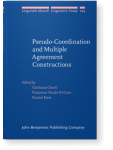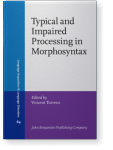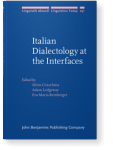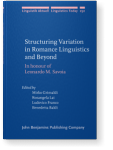Paolo Lorusso
List of John Benjamins publications for which Paolo Lorusso plays a role.
2022 Chapter 3. A bisentential syntax for a /bare finite complements in South Italian varieties: Motion verbs and the progressive Pseudo-Coordination and Multiple Agreement Constructions, Giusti, Giuliana, Vincenzo Nicolò Di Caro and Daniel Ross (eds.), pp. 65–98 | Chapter
In South Italian varieties of Apulia, Calabria and Sicily a restricted number of control/raising verbs, including stay/be, go, come and want embed finite complements, either bare or introduced by a. These are not necessarily languages with so-called subjunctive particles; in any event, the… read more
2020 When initial thematic role attribution lingers: Evidence for digging-in effects in Italian relative clauses Typical and Impaired Processing in Morphosyntax, Torrens, Vincent (ed.), pp. 57–71 | Chapter
In Italian, relative clauses are syntactically ambiguous between a subject and an object reading when the subject and the object have the same number. In the absence of disambiguating cues, the parser analyzes the sentence as a subject relative clause, as subject relative clauses are easier to… read more
2019 A person split analysis of the progressive forms in some southern Italian varieties Italian Dialectology at the Interfaces, Cruschina, Silvio, Adam Ledgeway and Eva-Maria Remberger (eds.), pp. 203–236 | Chapter
This paper explores the distribution of finite and non-finite constructions in the progressive periphrasis of (southeastern) Apulian varieties. The periphrases are formed by an inflected stay auxiliary, an optional connecting element a (=to) and an embedded verb which can be inflected or… read more
2018 Chapter 6. On gender and number: A psycholinguistic review Structuring Variation in Romance Linguistics and Beyond: In honour of Leonardo M. Savoia, Grimaldi, Mirko, Rosangela Lai, Ludovico Franco and Benedetta Baldi (eds.), pp. 97–109 | Chapter
In the theory of agreement developed by Chomsky (2000, 2001) φ features are undifferentiated, they are organized in a bundle of features, despite the intrinsically different information that each of them carries. However, while person is found to have an autonomous status in many psycholinguistic… read more



